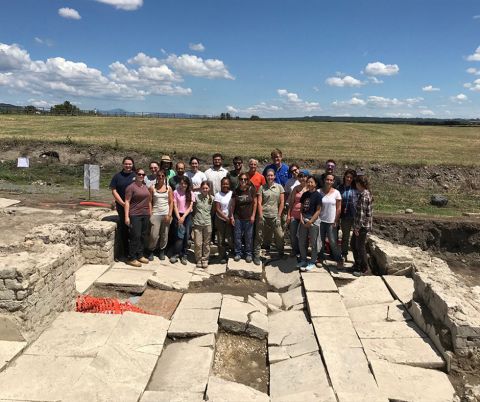Digital Cities and Cyberarchaeology (2017-2018)
This multi-year project is centered around the creation of an innovative digital workflow in cyberarchaeology using cutting-edge remote sensing and data recording technology and real-time visualization and 3D online publication of models and databases.
The team’s ongoing core archaeological and anthropological question is the diachronic study of urban transformations in different societies in the first millennium BCE and in the early Romanization. Sites include the Etruscan city of Vulci and the Greek colony of Akragas and the park of the Valley of the Temples, both in Italy, and Burgaz in Turkey.
In 2017-2018, the team produced case studies focused on urban transformation in relation to the landscape and the environment. Using digital recording technologies, the team produced multiple virtual reality apps designed to allow collaborative exploration by multiple simultaneous users in hybrid systems.
The team also developed a multimedia repository containing different kinds of digital models, digital artifacts, data visualizations and data sonifications.
Building on successful drone remote sensing at Vulci in 2016, team members used fixed-wing unmanned aircraft systems (UAS) and remote sensing approaches to survey all three study sites and created high resolution, radiometrically-calibrated orthomaps and 3D point cloud/mesh models.
The team also augmented a new “smart trowel” tool with a host of microcontrollers, wireless technologies and integrated sensors, allowing the tracking and transmission of position and movement, temperature, humidity, soil moisture and a collection of other data streams.
Timing
Summer 2017 – Spring 2018
Team Outcomes
Helena Murteira, Maurizio Forte (editors). “Digital Cities Between History and Archaeology.” 2020. Oxford University Press.
Maurizio Forte, Nevio Danelon. “Cyber-Archaeology.” 2019. Oxford Bibliographies.
New software based on polysensing technologies and excavation database (developed by Bill Seaman and Matthew Kenney)
Unity 3D application and augmented reality applications for touch screen and IOS (developed by Yashas Manjunatha)
Big Data and Archaeology (abstract submitted to Computer Applications & Quantitative Methods in Archaeology, 2017)
Vulci 3000 and Drone Archaeology (abstract submitted to Computer Applications & Quantitative Methods in Archaeology, 2017)
Vulvi 3000 – A Digital Challenge (abstract submitted to Archaeological Institute of America, 2017)
Multispectral UAVs in Classical Archaeology: The Case of Vulci (abstract submitted to Archaeological Institute of America, 2017)
Vulci 3000: 2017 Excavation Report (abstract submitted to Archaeological Institute of America, 2018)
Vulci, A Digital Perspective (edited by Maurizio Forte and Helena Murteira in Digital Cities, Oxford University Press)
This Team in the News
Faculty Perspectives: David Johnston
Vulci, i segreti degli Etruschi da svelare: riparte la campagna di scavo
Drawing on New Technologies, Duke Team Reveals an Ancient City’s Transformation
Duke Scholars Contribute Four New Exhibits to Roman Museum
Valle dei Templi e Duke University: al via mappatura hd del Parco Archeologico
Vulci 3000 Project: risultati della seconda campagna di scavo
Nuova scoperta a Vulci, rinvenuta cisterna etrusca celata da una antica pavimentazione romana
See related teams, Smart Archaeology (2018-2019) and Digital Cities and Polysensing Environments (2016-2017). This project was selected by the Franklin Humanities Institute as a humanities-connected project.

Team Leaders
- Maurizio Forte, Arts & Sciences-Classical Studies
- David Johnston, Nicholas School of the Environment-Marine Science and Conservation
- Regis Kopper, Pratt School of Engineering-Mechanical Engineering & Materials Science
- William Seaman, Arts & Sciences-Art, Art History, and Visual Studies
/graduate Team Members
-
Katherine McCusker, Art and Art History-AM, Art and Art History-PHD
/undergraduate Team Members
-
Isaac Andersen, Computer Science (AB)
-
Jeremy Chen, Computer Science (BS)
-
Yashas Manjunatha, Computer Science (BS)
-
Wenqin Wang, Computer Science (BS)
-
Yumin Zhang, Computer Science (BS), Philosophy (AB2)
/yfaculty/staff Team Members
-
Todd Berreth, North Carolina State University
-
Nevio Danelon, Arts & Sciences-Art, Art History, and Visual Studies
